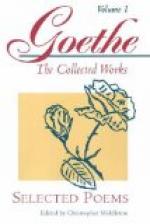Heedless where my blows fell. With bleeding noses
they halloed,
And could scarcely escape from the force of my blows and my kicking.
Then, as in years I advanced, I had much to endure from my father,
Who, in default of others to blame, would often abuse me,
When at the Council’s last sitting his anger perchance was excited,
And I the penalty paid of the squabbles and strife of his colleagues.
You yourself have oft pitied me; I endured it with patience,
Always rememb’ring the much-to-be-honour’d kindness of parents,
Whose only thought is to swell for our sakes their goods and possessions,
And who deprive themselves of much, to save for their children.
But, alas, not saving alone, for enjoyment hereafter,
Constitutes happiness, no, not heaps of gold or of silver,
Neither field upon field, however compact the estate be.
For the father grows old, and his son at the same time grows older,
Feeling no joy in To-day, and full of care for To-morrow.
Now look down from this height, and see how beauteous before us
Lies the fair rich expanse, with vineyard and gardens at bottom;
There are the stables and barns, and the rest of the property likewise;
There I also descry the back of our house, in the gables
Of the roof may be seen the window of my small apartment.
When I remember the time when I used to look out for the moon there
Half through the night, or perchance at morning awaited the sunrise,
When with but few hours of healthy sleep I was fully contented,
Ah, how lonely do all things appear! My chamber, the court, and
Garden, the beautiful field which spreads itself over the hillside;
All appears but a desert to me: I still am unmarried!”
Then his good mother answer’d his speech in a sensible manner
“Son, your wish to be able to lead your bride to her chamber,
Turning the night to the dearest and happiest half of your lifetime,
Making your work by day more truly free and unfetter’d,
Cannot be greater than that of your father and mother. We always
Urged you,—commanded, I even might say,—to choose some fair maiden.
But I know full well, and my heart has told me already
If the right hour arrives not, or if the right maiden appears not
Instantly when they are sought for, man’s choice is thrown in confusion,
And he is driven by fear to seize what is counterfeit only.
If I may tell you, my son, your choice already is taken,
For your heart is smitten, and sensitive more than is usual.
Answer me plainly, then, for my spirit already has told me:
She whom now you have chosen is that poor emigrant maiden!”
And could scarcely escape from the force of my blows and my kicking.
Then, as in years I advanced, I had much to endure from my father,
Who, in default of others to blame, would often abuse me,
When at the Council’s last sitting his anger perchance was excited,
And I the penalty paid of the squabbles and strife of his colleagues.
You yourself have oft pitied me; I endured it with patience,
Always rememb’ring the much-to-be-honour’d kindness of parents,
Whose only thought is to swell for our sakes their goods and possessions,
And who deprive themselves of much, to save for their children.
But, alas, not saving alone, for enjoyment hereafter,
Constitutes happiness, no, not heaps of gold or of silver,
Neither field upon field, however compact the estate be.
For the father grows old, and his son at the same time grows older,
Feeling no joy in To-day, and full of care for To-morrow.
Now look down from this height, and see how beauteous before us
Lies the fair rich expanse, with vineyard and gardens at bottom;
There are the stables and barns, and the rest of the property likewise;
There I also descry the back of our house, in the gables
Of the roof may be seen the window of my small apartment.
When I remember the time when I used to look out for the moon there
Half through the night, or perchance at morning awaited the sunrise,
When with but few hours of healthy sleep I was fully contented,
Ah, how lonely do all things appear! My chamber, the court, and
Garden, the beautiful field which spreads itself over the hillside;
All appears but a desert to me: I still am unmarried!”
Then his good mother answer’d his speech in a sensible manner
“Son, your wish to be able to lead your bride to her chamber,
Turning the night to the dearest and happiest half of your lifetime,
Making your work by day more truly free and unfetter’d,
Cannot be greater than that of your father and mother. We always
Urged you,—commanded, I even might say,—to choose some fair maiden.
But I know full well, and my heart has told me already
If the right hour arrives not, or if the right maiden appears not
Instantly when they are sought for, man’s choice is thrown in confusion,
And he is driven by fear to seize what is counterfeit only.
If I may tell you, my son, your choice already is taken,
For your heart is smitten, and sensitive more than is usual.
Answer me plainly, then, for my spirit already has told me:
She whom now you have chosen is that poor emigrant maiden!”
“Yes, dear mother, you’re right!”
the son with vivacity answer’d
Yes, it is she! And unless this very day I conduct
her
Home as my bride, she will go on her way and escape
me for ever,
In the confusion of war, and in moving backwards and
forwards.
Mother, then before my eyes will in vain he unfolded




